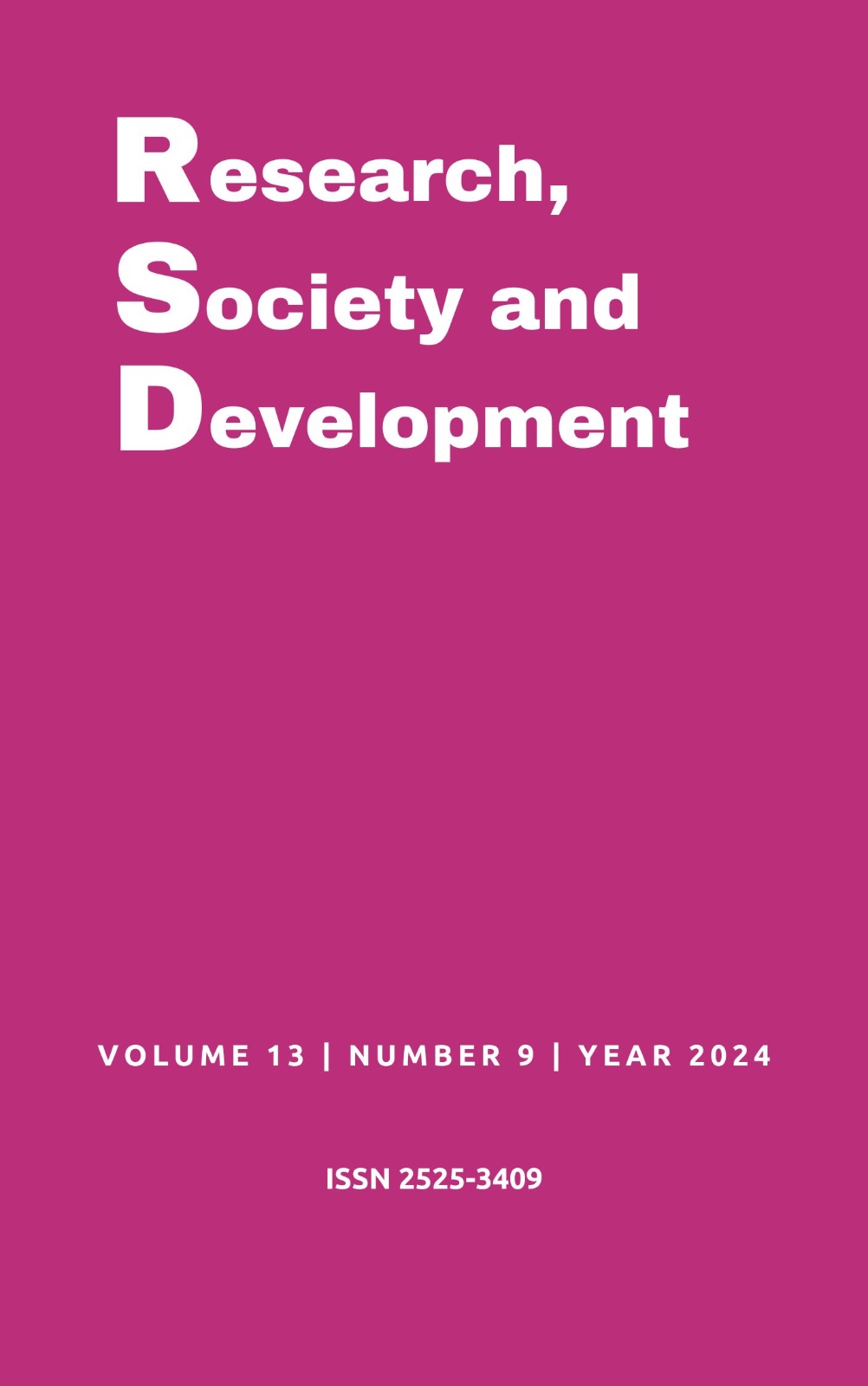Use of vitamin B12 in the treatment of diabetic neuropathy
DOI:
https://doi.org/10.33448/rsd-v13i9.46741Keywords:
Diabetes Mellitus, Diabetic Neuropathies, Vitamin B 12.Abstract
Introduction: Diabetic Neuropathy (DN) is a complication of Type 2 Diabetes Mellitus (T2DM) commonly associated with vitamin B12 deficiency, especially in metformin users. Vitamin B12 supplementation may alleviate neuropathic symptoms, but its effectiveness and impact on glycemic control are still uncertain. Objective: To evaluate the effectiveness of vitamin B12 in treating DN in T2DM patients, focusing on symptom reduction, quality of life improvement, and glycemic control, particularly in metformin users. Methodology: This study is an integrative literature review investigating the effectiveness of vitamin B12 in treating DN. The research accessed the Biblioteca Virtual em Saúde and PubMed databases, using descriptors such as "Vitamin B12" and "Diabetic Neuropathy." Results: A total of 21 articles were found between 2019 and 2024, with 19 included in the final sample (18 in English and 1 in German). Most articles were published in 2020. The studies included 37% systematic reviews or meta-analyses and 16% randomized clinical trials. Discussion: DN leads to severe symptoms, such as diabetic foot. Glycemic control is crucial but challenging due to limited long-term efficacy. Metformin can cause vitamin B12 deficiency in about 30% of patients after 4 years, and vitamin B12 supplementation may help alleviate neuropathic symptoms. Conclusion: Vitamin B12 may reduce DN symptoms and improve nerve function. Further studies are needed to determine the optimal dosage, treatment duration, and potential adverse effects.
References
Ahmed, M. A., Muntingh, G., & Rheeder, P. (2016). Vitamin B12 deficiency in metformin-treated type-2 diabetes patients, prevalence and association with peripheral neuropathy. BMC Pharmacology and Toxicology, 17(1), 44. https://doi.org/10.1186/s40360-016-0088-3. https://bmcpantoxicol.biomedcentral.com/articles/10.1186/s40360-016-0088-3.
Alharbi, T. J., et al. (2018). The association of metformin use with vitamin B12 deficiency and peripheral neuropathy in Saudi individuals with type 2 diabetes mellitus. PLoS One, 13(10), e0204420. https://doi.org/10.1371/journal.pone.0204420. https://journals.plos.org/plosone/article?id=10.1371/journal.pone.0204420.
Álvarez, M., Sierra, O. R., Saavedra, G., & Moreno, S. (2019). Vitamin B12 deficiency and diabetic neuropathy in patients taking metformin: A cross-sectional study. Endocrine Connections, 8(10), 1324–1329. https://doi.org/10.1530/EC-19-0382.
Arauza, E., Cardoze, D., Salehji, A., & Liguas, A. (2021). Deficiencia de vitamina B12 relacionada al uso de metformina. Revista Médico Científica, 33(1), 52–63. https://doi.org/10.37416/rmc.v33i1.585.
Batulwar, P. S., & Anjankar, A. (2024). Individuals diagnosed with type 2 diabetes mellitus and the status of vitamin B12 deficiency: A review. Cureus, 16(2). https://doi.org/10.7759/cureus.2024.
Bell, D. S., & Goncalves, E. (2021). Alcohol consumption as a causator and/or an accelerator of neuropathy in people with diabetes is regularly://link.springer.com/article/10.1007/s13300-021-01185-2.
Didangelos, T., et al. (2020). Efficacy and safety of the combination of superoxide dismutase, alpha lipoic acid, vitamin B12, and carnitine for 12 months in patients with diabetic neuropathy. Nutrients, 12(11), 3254. https://doi.org/10.3390/nu12113254.
Didangelos, T., et al. (2021). Vitamin B12 supplementation in diabetic neuropathy: A 1-year, randomized, double-blind, placebo-controlled trial. Nutrients, 13(2), 395. https://doi.org/10.3390/nu13020395.
Karedath, J., et al. (2022). The impact of vitamin B12 supplementation on clinical outcomes in patients with diabetic neuropathy: A meta-analysis of randomized controlled trials. Cureus, 14(11). https://doi.org/10.7759/cureus.126132.
Longa Lopez, J. C. M., et al. (2024). Vitaminas B1, B6, B12 y neuropatías periféricas: Consenso de expertos. Revista de la Facultad de Medicina Humana, 24(1), 101–114. https://doi.org/10.25176/rfmh.v24i1.6413.
Prado, F. (2023). Neuropatía periférica y vitaminas del complejo B: Revisión y algoritmo terapéutico. Revista Mexicana de Endocrinología, Metabolismo y Nutrición, 10(3).
Rathis, T. S., et al. (2023). Prevalence of vitamin B12 deficiency in type 2 diabetes mellitus patients on metformin therapy. Cureus, 15(4). https://doi.org/10.7759/cureus.24522.
Rojbi, I., et al. (2023). Statut en vitamine B12 chez les diabétiques type 2 traités par metformine par rapport à ceux sans metformine: Une étude transversale en Tunisie. La Tunisie Médicale, 101(4), 433–439.
Sakyi, S. A., et al. (2021). Profiling immuno-metabolic mediators of vitamin B12 deficiency among metformin-treated type 2 diabetic patients in Ghana. PLoS One, 16(3), e0249325. https://doi.org/10.1371/journal.pone.0249325.
Schleicher, E., et al. (2023). Clinical pathobiochemistry of vitamin B12 deficiency: Improving our understanding by exploring novel mechanisms with a focus on diabetic neuropathy. Nutrients, 15(11), 2597. https://doi.org/10.3390/nu15112597.
Sun, Y., Lai, M. S., & Lu, C. J. (2005). Effect of methylcobalamin on diabetic neuropathy. Acta Neurologica Taiwanica, 14(2), 48–54.
Wakeman, M., & Archer, D. T. (2020). Metformin and micronutrient status in type 2 diabetes: Does polypharmacy involving acid-suppressing medications affect vitamin B12 levels?. Diabetes, Metabolic Syndrome and Obesity, 2093–2108.
Wei, J., et al. (2022). Is metformin a possible treatment for diabetic neuropathy?. Journal of Diabetes, 14(10), 658–669. https://doi.org/10.1111/1753-0407.13212.
Yadav, A., et al. (2023). Vitamin B12 deficiency among metformin treated type 2 diabetic mellitus patients visiting the Department of Medicine of a tertiary care centre. JNMA: Journal of the Nepal Medical Association, 61(267), 861.
Downloads
Published
Issue
Section
License
Copyright (c) 2024 Marcos Gabriel Bastos Sereno; Hugo Almeida Rezende; Polyana da Silva Caçador; João Pedro Alves Portilho Dornelas

This work is licensed under a Creative Commons Attribution 4.0 International License.
Authors who publish with this journal agree to the following terms:
1) Authors retain copyright and grant the journal right of first publication with the work simultaneously licensed under a Creative Commons Attribution License that allows others to share the work with an acknowledgement of the work's authorship and initial publication in this journal.
2) Authors are able to enter into separate, additional contractual arrangements for the non-exclusive distribution of the journal's published version of the work (e.g., post it to an institutional repository or publish it in a book), with an acknowledgement of its initial publication in this journal.
3) Authors are permitted and encouraged to post their work online (e.g., in institutional repositories or on their website) prior to and during the submission process, as it can lead to productive exchanges, as well as earlier and greater citation of published work.


